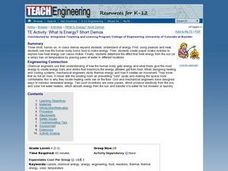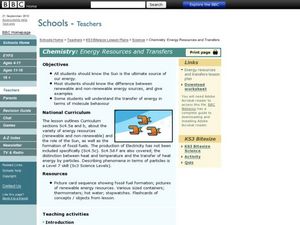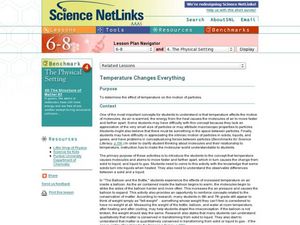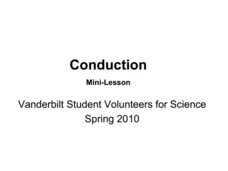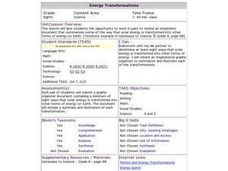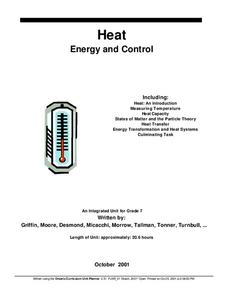Pennsylvania Department of Education
Energy in Motion
Fifth graders explore energy transfer. In this thermal energy lesson, 5th graders stretch rubber bands several times and estimate the band's temperature change. Students identify this action as an example of thermal energy. Students...
Curated OER
Transfer of Thermal Energy
Students define temperature and heat, distinguish between temperature and heat flow, calculate amount of heat energy released or absorbed in chemical process, and design procedure, through experimentation, to gather and evaluate data to...
Curated OER
What Is Energy? Short Demos
Students engage in three short, hands-on, in-class demos which expand students' understand of energy. First, using peanuts and heat, students see how the human body burns food to make energy. Then, they create paper snake mobiles to...
Space Awareness
Oceans as a Heat Reservoir
Oceans absorb half of the carbon dioxide and 80 percent of the greenhouse gases released into the atmosphere. Scholars learn how and why the oceans store heat more effectively than land and how they help mitigate global warming. Pupils...
Curated OER
How Electric Current Produces Energy
Fifth graders are introduced to the concept of electric currents. In groups, they develop their own game board to test different circuits to determine if they are complete. They record their observations of the energy transfer between...
Curated OER
Measuring Thermal Energy Transfer
Students conduct an experiment to calculate and quantify heat transfer. They conduct the experiment, and complete a data and lab conclusion sheet.
Curated OER
Chemistry: Energy Resources and Transfers
Students explore the concepts of energy resources and energy transfers. In this chemistry lesson, students examine renewable and non-renewable energy sources as they view classroom demonstrations and discuss the concepts as well as their...
Curated OER
Heat Transfer
Students examine heat transfer using energy efficient houses. In this heat transfer lesson students calculate the heat that is transferred between a system and its surroundings.
Curated OER
Temperature Changes Everything
Middle school chemists visit interactive websites in order to discover what happens to molecular motion when heat is added to matter. They conduct an experiment that demonstrates the expansion of matter with the addition of heat. A lab...
Science Matters
Energy and Winds
In the study of wind energy, scholars build a small windmill and observe how it transfers wind into mechanical energy. Learners will make connections to the previous lesson with concepts such as the creation of wind through convection.
University of California
Energy and Biomass Pyramids
Young scientists play tag as they act out the food pyramid in the ocean ecosystem. Energy circles pass from the smaller prey to the predators and at the end of the activity, a data chart and analysis questions allow pupils to apply their...
Curated OER
Do It Yourself: Energy Transfer Lesson Plan
Fifth graders discuss the different types of energy and experiment with tesla coil to show the three types of energy transfer. They write conclusions in their science journal.
Curated OER
Heat and Conduction
This simple activity is ideal for upper elementary learners when studying physical science. Using their sense of touch to describe how hot something feels, and then comparing their observations to thermometer measurements, they discover...
Curated OER
Go With the Energy Flow
Students explore energy and nutrient flow. In this science lesson plan, students diagram the flow of energy through food chains and food webs. Students discuss the importance of energy flow in Earth's ecosystems.
Curated OER
Insulators, Conductors, and Energy Transfer
Third graders conduct experiments to determine what types of material make good insulators. They prepare a graph of time vs. temperature for their sample. They choose a graph using each kind of material to display for class analysis and...
Science Matters
Hot Wire S’mores
The proof is in the marshmallows. Believing that electric energy can transform into heat energy can be abstract, but a hands-on lesson plan gives pupils a concrete example. Young scientists cut marshmallows with copper wires before and...
American Physiological Society
Why is Kettle Corn Cooked in Copper Pots?
The kitchen — it's not just for eating anymore! Specific heat is often a difficult concept to grasp, so give it context by relating it to cooking. Learners gain experience in the principles of thermal energy transfer by designing an...
Curated OER
BioFuels: The Chemistry and Economics of Alternative Fuels
Junior chemists manufacture biodiesel in the lab. In this exercise, they check the purity of the biodiesel using thin layer chromatography. They also calculate its density and heat of combustion. They are sure to rise to the challenge...
Curated OER
Energy Transformations
High schoolers investigate energy transformation in the form of wind energy. They read a handout, answer questions, identify points in an energy system where transformations occur, and build a wind turbine.
Virginia Department of Education
Heat Transfer and Heat Capacity
It's time to increase the heat! Young chemists demonstrate heat transfer and heat capacity in an activity-packed lab, showing the transitions between solid, liquid, and gaseous phases of materials. Individuals plot data as the changes...
Curated OER
Exploring Electricity - Four Activities
These are four classic activities used for instructing upper elementary electricians. The first involves experimenting with the Van de Graaff generator. The second is a series of hands-on experiences with static. In the third activity,...
Curated OER
Energy and Control
Seventh graders construct a lunch box that maintains functional temperature zones and does not allow heat transfer between the zones. They examine the transfer of heat, the capacity of certain materials to hold heat, and how the...
Curated OER
Heat: Mini Unit
Students experiment with heat. In this physical science instructional activity, students engage in hands-on activities to develop concepts related to heat. Students offer explanations for their observations using given vocabulary.
Curated OER
Making Energy "trails"
Students explore ten different stations that demonstrate either chemical, kinetic, or mechanical energy. They examine the way energy is transferred during each station's hands-on activity. Stations include vinegar and baking soda,...




